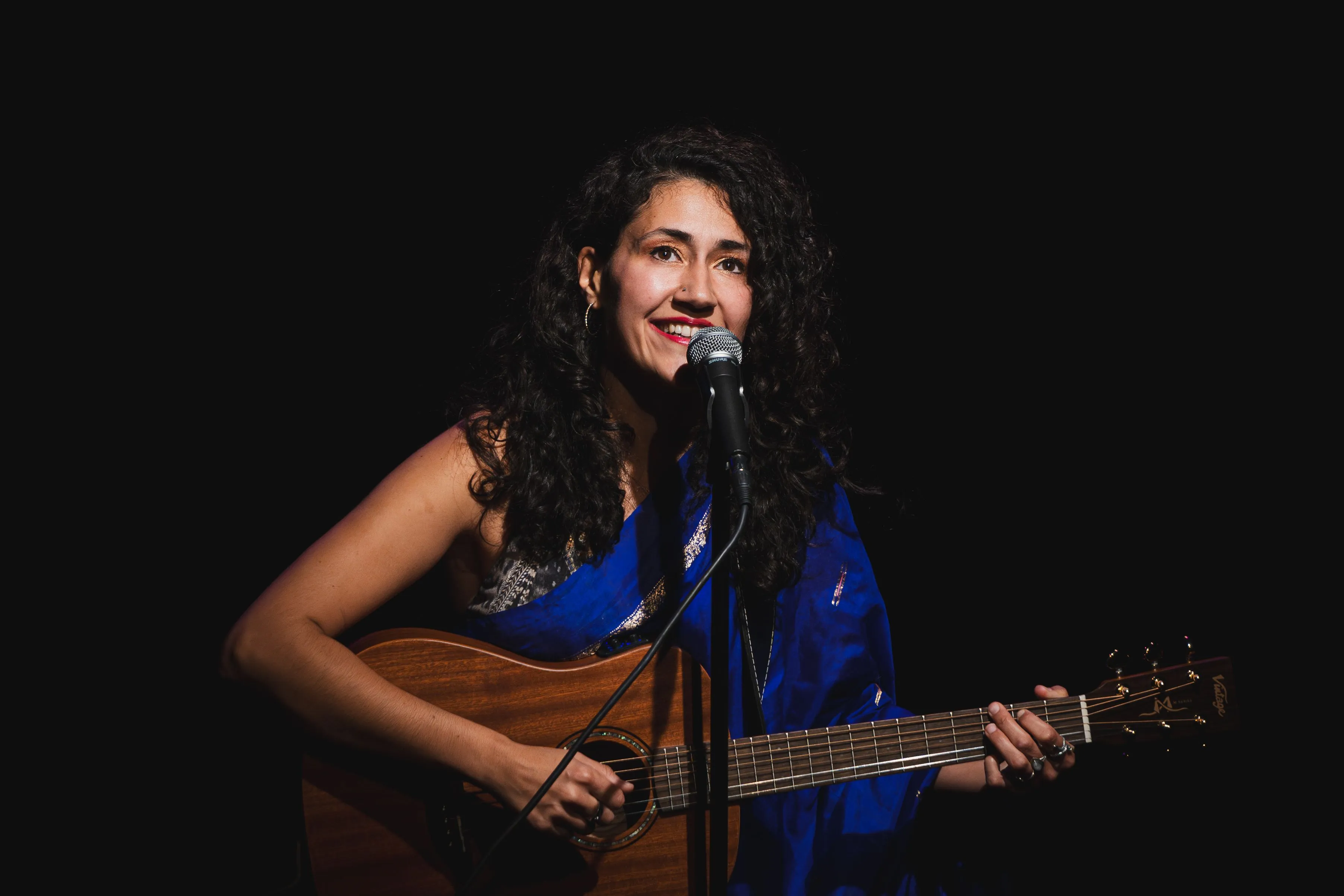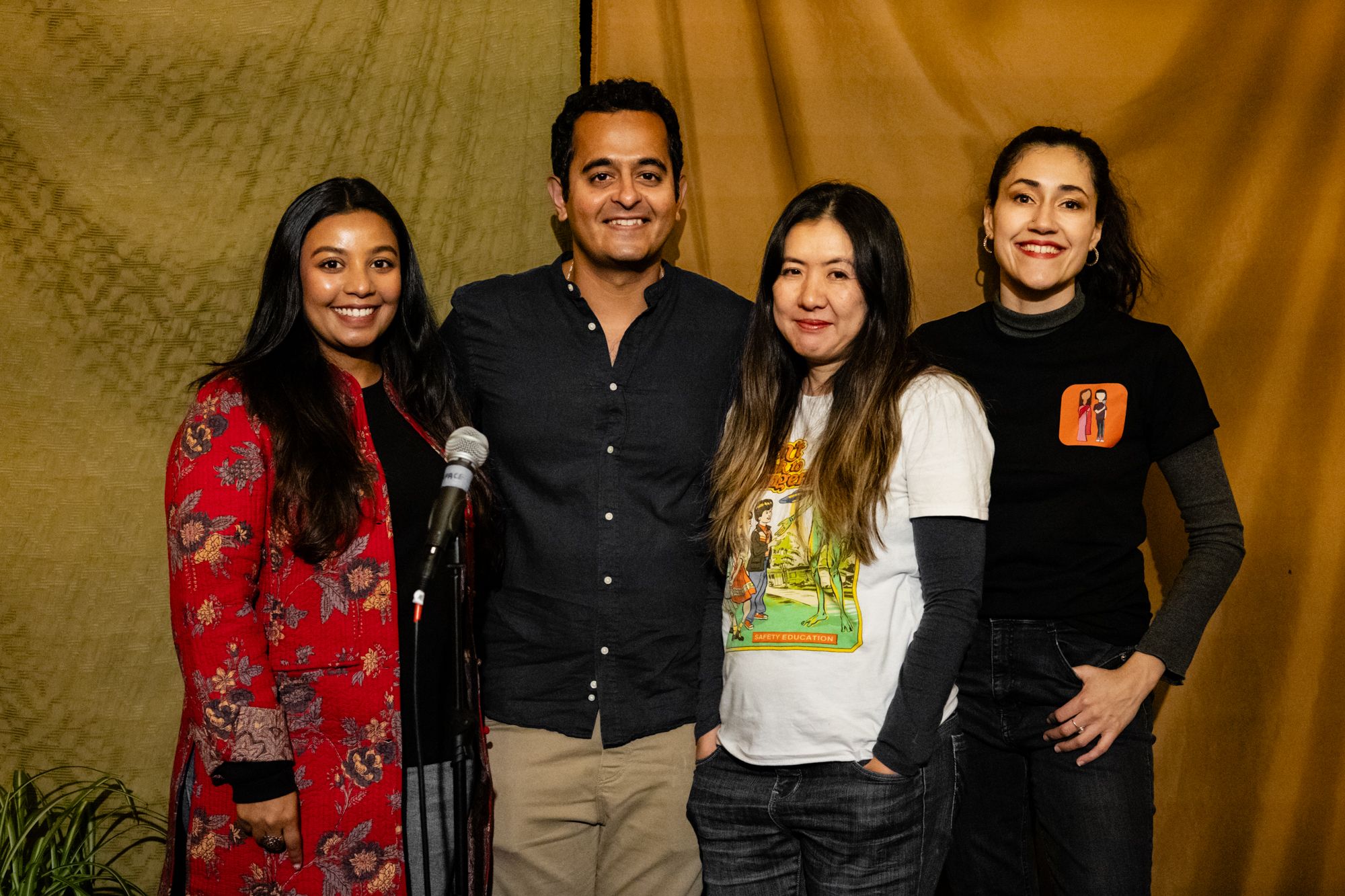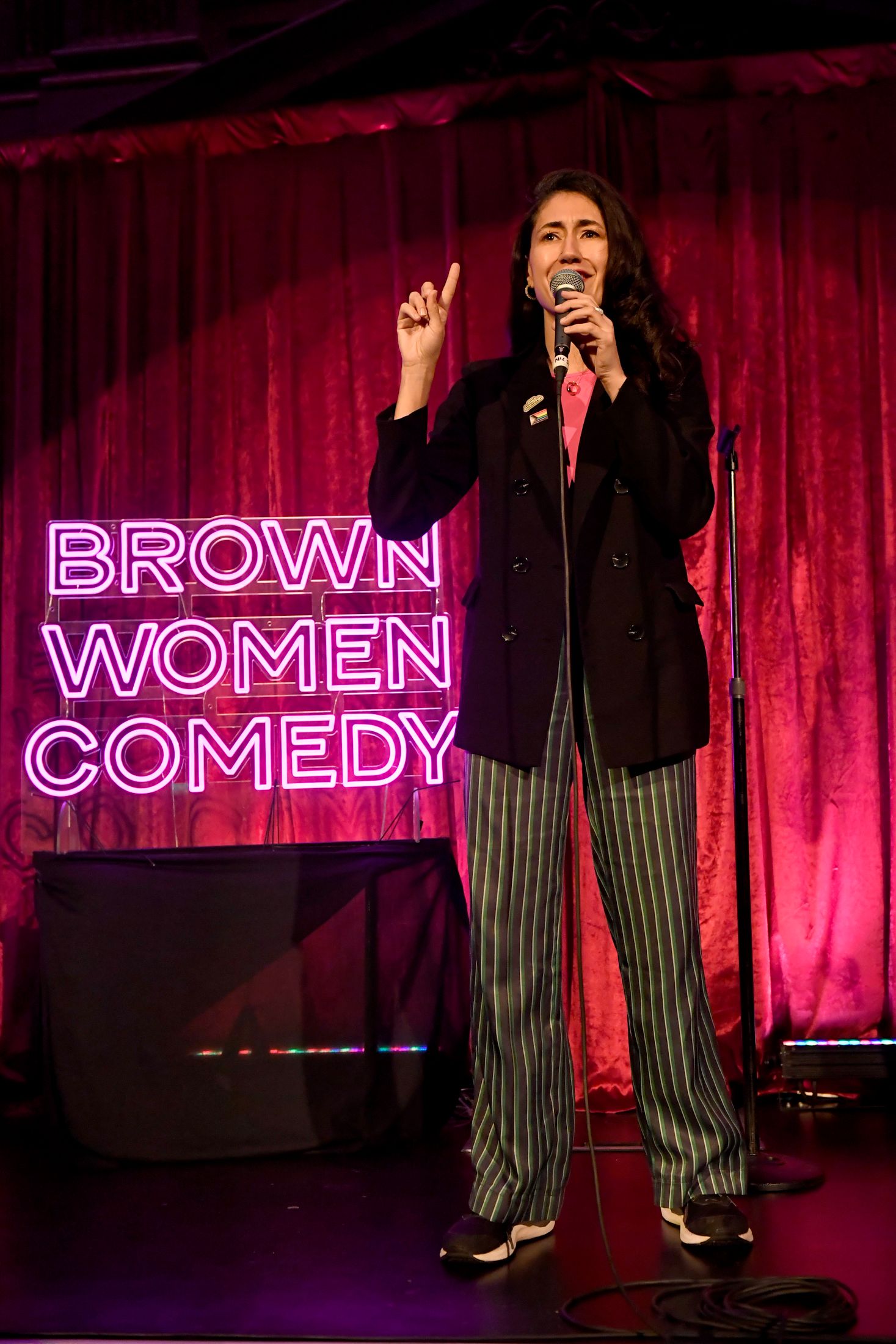Laughing Through the Pain, Leading Through the Punchlines
In a country where the comedy circuit has long lacked Asian representation, Jess Karamjeet is here to change the script.

Pathfinders is a new series spotlighting artists and organisations taking the road less travelled by adopting new or innovative approaches to their mahi.
When Jess Karamjeet landed in Aotearoa in 2019, she was armed with a Master’s degree in Writing for Performance, screenwriting credits on hit shows like Neighbours and Cold Feet, and a brewing ambition: to finally try stand-up comedy.
Six years later, her ambition has transformed into a collective one. Karamjeet is the founder of ‘PACSA (Laughs)’: the Pan-Asian Comedy School Aotearoa. In a country where the comedy circuit has long lacked Asian representation, PACSA is here to change the script.
The half-Punjabi, half-British comedian answers the call from her room which is bathed in soft pink light. Her long dark curls frame her face, a springy fringe bouncing on her forehead as she speaks. Behind her, books peek out on a slightly disordered shelf – the kind of creative mess that suggests ideas in motion.
As we begin our interview, she twirls a pen between her fingers, pausing now and then to scribble into a nearby notebook, thoughts spilling out almost as quickly as she speaks.
Karamjeet’s introduction to stand-up comedy began with the New Zealand Comedy School. Alongside learning joke structure, comedic timing, performance fundamentals, and mic technique, she came to a sobering realisation: she still felt othered.
“There wasn't a penny drop moment. It was a slow process of me being in the Open Mic scene and finding that I was only one of a couple brown faces there.”
To push for better diversity and representation on the New Zealand Comedy Guild board, Karamjeet joined forces with five other Kiwi comedians, including Ed Amon, Heta Dawson, Kura Turuwhenua and Courtney Dawson. The aim was to shake up the system and open doors for voices that hadn’t been heard enough.
At first, the push seemed promising – with progress reflected in evolving guild guidelines and open conversations. But it quickly became clear that representation on paper doesn't always translate into action.
“Even after doing that work, we realised it's all well and good trying to create more equity, but if we don't have performers, the five of us have to take on this role and responsibility…It's a lot on a few shoulders.”
It became clear that representation can’t just live in the policies, it needs to be lived onstage. That’s what led Karamjeet to create PACSA. A space to support emerging comedians through workshops, one-on-one writing sessions, and an end-of-term showcase, where newer performers could learn, grow, and laugh – on their own terms.
PACSA is an eight-week training programme that’s less about fast-tracking people into a scene, and more about giving them the tools – and belief – to own the mic in the first place.
“I wanted to give people the guidance of a comedy school, showing students what is a set, what’s a bit, how do you write a joke? From the outside – especially if you're a minority – the industry can feel pretty daunting.”
Karamjeet doesn’t just mentor emerging voices, she is one; drawing on her experience as a biracial, queer woman with fibromyalgia – a chronic pain condition that affects her mobility, muscle tension, and internal organs - to craft stand-up grounded in personal narrative and radical visibility.
“I was incredibly sick and my mobility was struggling,” she recalls. At the time, she was working in a store, watching women decades older than her bounce up and down stairs with ease while she struggled to walk home after shifts.
“I would be in so much pain and just get stuck, and realise something’s quite, quite majorly wrong.”
Because her disability was invisible, she kept it hidden – especially in professional spaces.
Even while working as a storyline writer, writing nuanced, intersectional characters, she felt the pressure to stay silent.
“I still tried to keep it a secret from my colleagues,” she says. “Because of this burden of feeling like I might have discrimination against me, or perspectives would be that I'm not capable.”
When her bosses eventually found out, they were supportive – telling her they would’ve made accommodations like flexible hours or remote work.
“That really taught me that my preconceived notions of how people will treat me are something I need to squash down.”

In 2022, another piece of the puzzle clicked into place when she was diagnosed as neurodivergent, with combined ADHD.
“That whole process just felt remarkable,” she recounts of the transformative realisation. “I could understand my younger self. Things like rejection sensitivity, hyperfocus, or emotional volatility… I finally knew that it’s not that I’m wrong, it’s that I’m different.”
For the writer and comedian, the kaupapa of ‘PACSA (Laughs)’ is deeply personal. Her anecdotal, autobiographical work has always focused on navigating life through her own lens – filling the gaps left by the absence of diverse voices she longed to see growing up.
“Growing up, there were only a few brown faces on TV,” she notes. “How many South-Asian leading men or women or non-binary people do we get in TV shows or in comedy? How many neurodivergent people do we get to see?”
“The kaupapa of ‘PACSA (Laughs)’ is to uplift and provide opportunity for people who have a creative seed growing inside them, but they just need that extra help in blossoming in a safe space.”
That sense of safety, Karamjeet explains, is where the magic really happens. It’s what allows people to show up fully, a place for emerging comedians to build confidence, develop skills, and find their voice. Not in spite of their differences – but because of it.
“The classes of PACSA are really transformational because students can create and play with people who are like-minded. They’re not having to adapt or modify their behavior in order to please a Pākeha audience. And that feels like the greatest strength – it allows them to be their authentic selves.”
In the wider comedy scene, things aren’t always so simple. New comedians are often told to acknowledge and disarm their differences before they’ve even delivered a punchline – a form of social code-switching that disproportionately falls on those who don’t fit the mainstream mould.
“The first thing we’re taught in comedy is how an audience perceives you – so it’s important to address that right at the top of your set,” she details.
“Whether it’s a visible tattoo or something distinctive about you, it’s about answering the unspoken questions an audience might have before you even get to the punchline.”
It’s a pattern Karamjeet has seen and felt before.
“I think a lot of new comics fall into that trap of feeling like they have to code switch. When people do that in their daily life – in the workplace or in social settings – I think it’s really important to allow them, within the confines of four walls and with the power behind a microphone, to just allow them to be.”

The work Karamjeet does now is, in many ways, for her younger self - and for others like her. She thinks of her 12-year-old cousin, who is also neurodivergent, and how the world so often tells kids like them that they’re “too intense and too loud and too dramatic.” But for Karamjeet, there’s “a real sort of special uniqueness that needs nurturing.”
She felt that same sense of recognition when watching Jo Randerson's Speed Is Emotional, a theatre show exploring ADHD experiences.
“It felt like being seen,” she says. “It felt like articulating a million things about the way our brains work which doesn't get articulated on stage very often.”
Karamjeet’s work reframes "otherness" as a creative superpower, inviting audiences into the chaos, complexity, and comedy of her lived experience. Her latest solo show, RAY!, showing at the NZ International Comedy Festival, is a wild ride through diving, drag bars and debauchery – as with all her work, it’s deeply autobiographical, full of grit and glitter.
Whether she’s onstage or mentoring from the sidelines, one thing’s clear: she’s not just performing. She’s paving the way.
You can catch Jess Karamjeet in RAY! during this year’s NZ International Comedy Festival – 15 & 16 May.
Writer Bio: Nabeelah Khan is a freelance journalist and creative storyteller based in Tāmaki Makaurau, Aotearoa. Drawn to both entertainment journalism and socially conscious storytelling, she blends descriptive narrative writing with a deep curiosity about identity, culture, and community. For Khan, writing is essential to the way she makes sense of the world. Her work often centres on underrepresented voices, aiming to tell stories that resonate, challenge perspectives, and spark conversation."